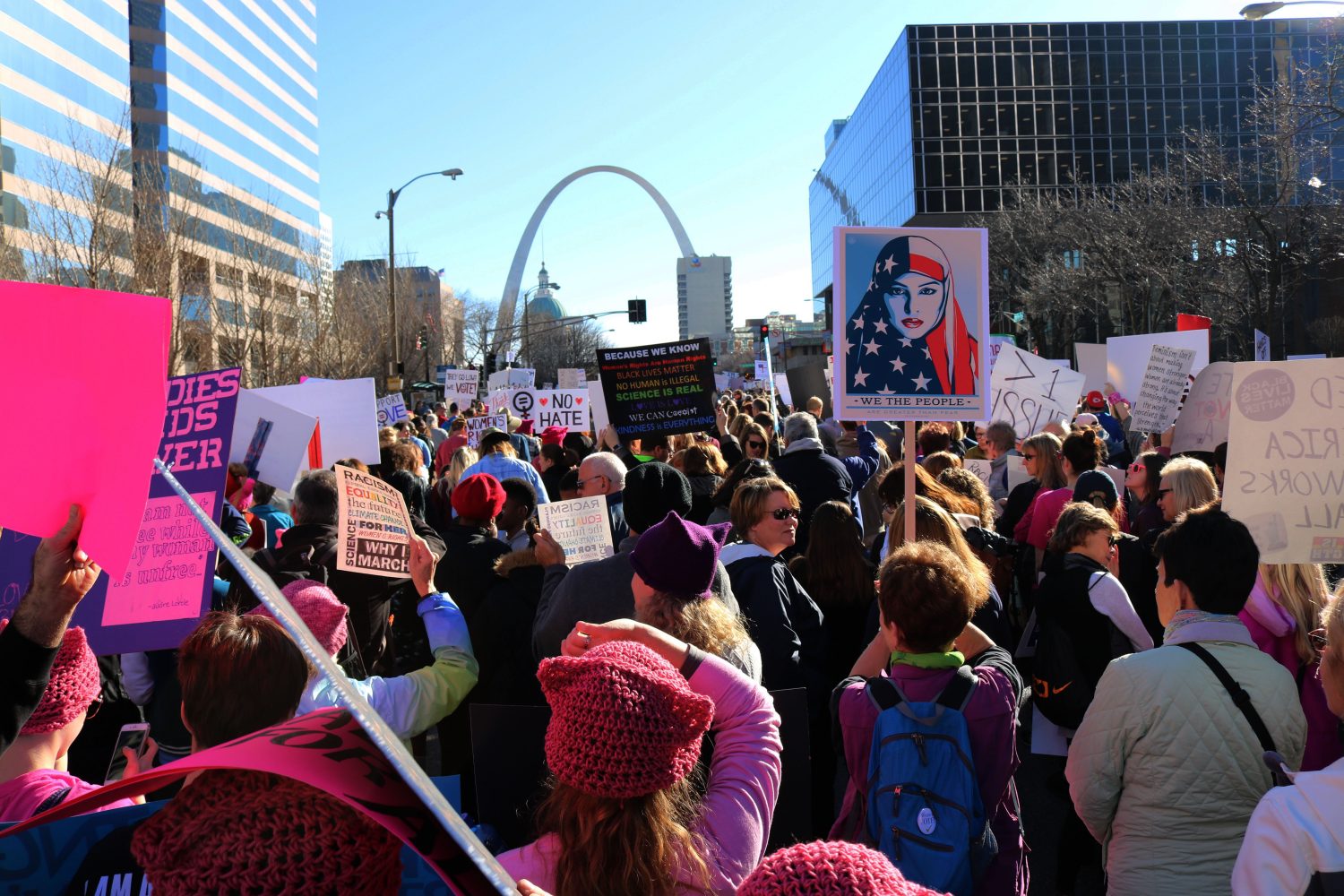In a year as politically charged as 2016, Saint Louis University was the center of many clashing ideologies that challenged students, professors and the broader community. The Women’s March on Washington, that took place on Jan. 21 was the culmination of past events and a response to a changing and controversial administration; an administration that has left many on Saint Louis University’s campus worrying about what is to come.
The march had extensions in all fifty states and around the world. Several students participated in students participated in the Women’s March on St. Louis that turned the length of Market Street into a sea of pink hats, rainbow flags and cardboard signs.
Rosemary Bernstein, a senior at SLU, expressed that she marched because the new administration does not represent her and her values. “Hate, bias, and lies do not represent me and do not represent what makes America great,” she said.
Bernstein, along with many other participants, marched not only for her rights as a woman but for the rights of the disabled, people of color, the LGBTQ community, immigrants and refugees. “I refuse to stand by while their rights are being stolen, just as I would hope they would stand by me.”
In the new wave of feminism that society is experiencing, the focus is “women’s rights are human rights,” a saying that is printed on the Women’s March on Washington Facebook page. A phrase meaning that everyone is equal regardless of gender, race, religion, sexual orientation or country of origin.
When asked if a feeling of representation for all people was at the march, Braden Spratt, a male participant in the march and a senior at Saint Louis University said, “I think that our liberations are tied together. When women are treated this way, it takes away from all of our dignity.”
A group of SLU students and professors also traveled to Washington D.C. to take part in the main march.
Ellen Cowell, an English professor, stated that she was worried at first that the trip would affect her ability to teach during the first week of class but ultimately, she felt that Washington D.C. is where she needed to be. She went on to say “When Clinton lost the election, I immediately felt that I wanted to be in D.C. on Inauguration Day to protest Trump’s election and by extension any national policy that promotes nativism, racism, sexism and homophobia.”
Professor Cowell, who teaches courses focussed on representations of women and the LGBTQ community in literature and film, strives to implement a sense of importance and relevance in her students regarding democratic processes such as protesting and to stay aware of what is happening culturally, regardless of political opinion.
“For me it was a response to the feeling a lot of people have been feeling…isolation, discouragement.”
Senior Taylor Jackson was one of five Saint Louis University students that drove 13 hours to Washington D.C. to attend the march. “For me it was about going and joining a community of people that were expressing the opposite emotions, so hope, commitment, moving forward.”
For Jackson, the Washington D.C. march was very intentional in its planning; an ode to the message of equality that the march focused on.
The march drew people from many diverse backgrounds to voice their opinions on the new administrations proposed policies.
The speakers ranged all the way from activist Angela Davis to Janet Mock, a transgender woman of color and the Mothers of the Movement, a group of black women whose sons had been killed by police brutality. “It’s a huge privilege to be able to travel to D.C. and to feel safe while protesting,” Jackson says as she speaks about the intersectionality of feminism and issues that surround other marginalized communities.
The Women’s March on Washington is already garnering the title of the largest protest in the history of the United States.
The organizers of the march are currently in the process of planning a 100-day push for activism.
10 Actions in 100 days was initiated in response to the fear that many of the that people have made that commitment will die out now that the march is over.
“What did the protests achieve?” asks professor of Medieval Literature Ruth Evans. “We won’t of course know immediately what the Women’s March achieved, but it will go down in history.”






